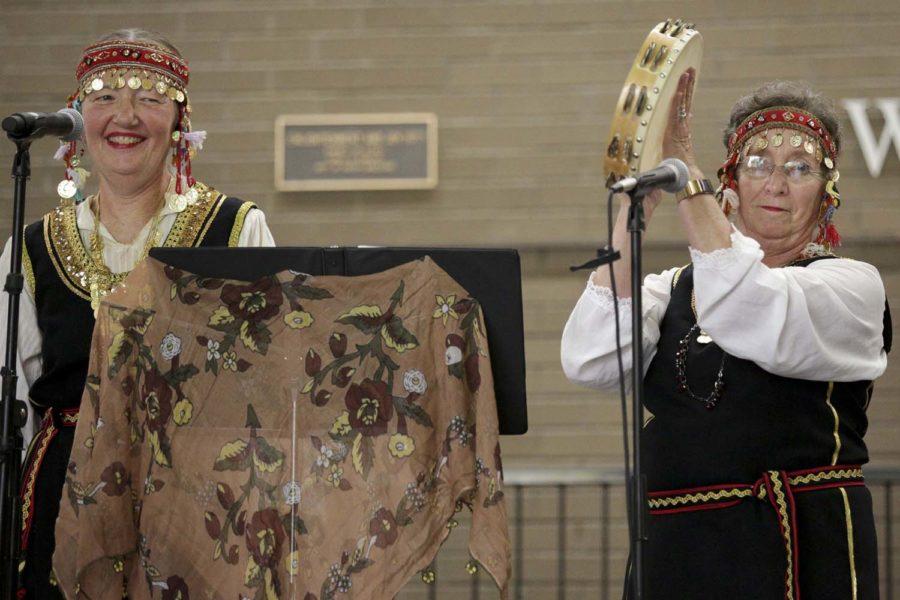Eurofest creates cultural connections
Thomas Yang | Assistant Visual Editor
The Balkan Babes ensemble performs Balkan music at Sunday afternoon’s Eurofest in Posvar Hall.
August 27, 2019
The first floor of Posvar Hall on Sunday was neither quiet nor still — rather, it mirrored a European marketplace on a warm summer day.
Vendors from both Pitt and outside organizations lined the walls during Pitt’s Eurofest, a celebration of European heritage and cultures. From Pitt Study Abroad to Pittsburgh Scottish Heritage to local food and artisans, the wide variety of activities delighted crowds of students and families. Little kids danced and vendors listened to performances from Eastern European music groups Gypsy Strings, NAT 28 and Balkan Babes as the colorful flags of the European Union decorated the ceiling.
Eurofest is partially sponsored by a grant from the U.S. delegation to the EU, which has allowed Pitt’s Center for European Studies to host the open-to-the-public event with free admission for the past four years.
Assistant Director of the European Studies Center Allyson Delnore wrote the “Getting to Know Europe Grant” with the hopes of introducing Europe from an American perspective to the Pittsburgh community by fusing European culture with Pitt community and academics.
Standing among the colorful displays and bustling vendors, Delnore was visibly proud of the results of her hard work, but humbly chalked it up the success of the Center for European Studies and its programs for the community.
“The most important thing that we get to do is, basically, bring a piece of the EU to Pittsburgh … I think that’s what I find most exciting,” Delnore said.
The President of the Irish Nationality Room Committee, who gave his name as “Mr. Sean,” was present and ready to table for his committee. Decked head to toe in 30 shades of green, he expressed his enthusiasm for the many learning opportunities the festival features.
“What I like most is that it’s educational,” he said. “I’ve been here every year representing the Irish Nationality rooms and every year students come in for a learning experience.”
Some of these featured learning experiences were the “mini language lessons” courtesy of Pitt’s Less-Commonly-Taught Languages Center. Staged in the Global Hub, nine enthusiastic professors from this niche section of Pitt’s linguistic department held 15-minute lectures in which they taught the basics of their respective languages.
The LCTL department places emphasis on propagating not only the languages, but the culture of diminishing and smaller populations. In Europe, this places particular focus on Western, Balkan and “Euraisian” languages such as Serbian, Croatian, Greek, Turkish and Irish.
Following these linguistic experiences were three featured lectures focusing on the cultural, political and historical explorations into the European Union, including “Diversity and Politics in Ireland” and “The Synagogue: A Missing Chapter in the Histories of European Architecture.”
Attendees also had the opportunity to see finished projects from Europe Day — a K-12 program backed by Pitt’s Center For European Studies which challenges children in local schools to research and report on different cultures and current events within the EU. The most creative and informative poster boards, short movies and papers for the 2019 season were placed on display right near the main stage.
For the foodies, the festival featured diverse treats from all around Pittsburgh. Macarons and Balkan pastries were distributed at a tent outside, samples of Slavic treats were passed around indoors and, of course, no University event is complete without food trucks. Eats like Steel City Chimneys, PGH Pierogi Truck and Fredo’s Deli filled the air with delectable scents.
Activity Events and Partnerships Coordinator for The Center for European Studies Iris Matijevic has been putting her efforts into making sure Eurofest goes off without a hitch ever since she herself was a student here at Pitt.
After graduating two years ago, she has overseen the celebration as a faculty member, and after overseeing every aspect of the festival from different perspectives, she said that she can’t pick a favorite part.
Matejevic said that the most rewarding part of seeing the “Europe in the Burgh” is the unifying effect that the festival has on the Pitt community.
“I just love to see it all come together and everyone really enjoying it,” said Matejevic.








